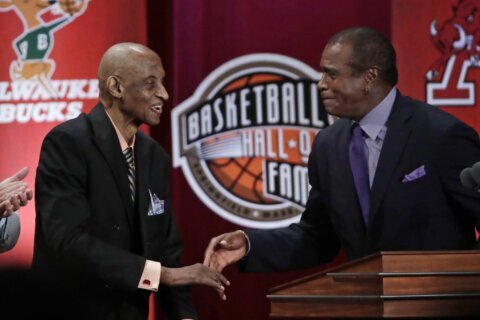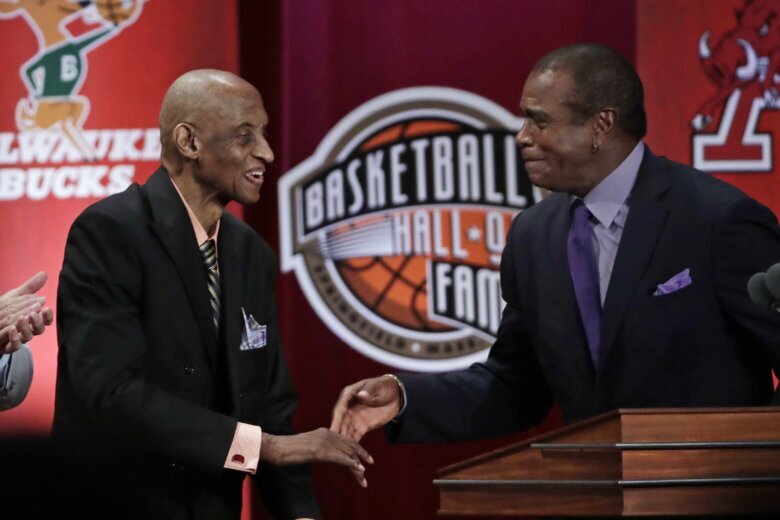
Throughout February, WTOP is celebrating Black History Month. Join us on air and online as we bring you the stories, people and places that make up our diverse community.
Black History Month is all about highlighting hidden figures from America’s ongoing march toward equality.
Enter Dick Barnett, whose jersey hangs in the rafters of Madison Square Garden as a two-time NBA champion who made it his mission to get the Naismith Memorial Basketball Hall of Fame to induct his college basketball team as the first historically Black college to win a national championship.
Make that three national championships. In a row. During the height of discrimination.
This important and inspiring story is chronicled in the brand new documentary “The Dream Whisperer,” which premieres on Howard University’s WHUT on Feb. 3 and Feb. 16, followed by WETA World on Feb. 24 and Feb. 26, and WETA Metro on March 30, all perfectly situated between Black History Month and March Madness.
“The timing worked out really nice, but it certainly wasn’t planned this way,” director Eric Drath told WTOP. “It’s now been over 12 years from when we first decided to make the film and take on the project until now. … The mission to get it released and distributed [has] certainly been a quest, an odyssey and it parallels the story itself, which was a feat that was basically lost in history until one man, Dick Barnett, started to do something about it.”
Born and raised in Gary, Indiana, Barnett experienced segregation first hand where Black high-school basketball teams could win the city title but weren’t allowed to compete in the state tournament. After the Supreme Court decision Brown v. Board of Education demanded integration in 1954, Barnett propelled his team to the 1955 state championship, a battle between two Black high schools, losing against future NBA Hall of Famer Oscar Robertson.
Draining shots under the nickname of “Skull” Barnett, he was recruited to play at Tennessee A&I College (later renamed Tennessee State University) in Nashville, Tennessee, where groundbreaking Coach John McLendon had been petitioning to allow Black colleges to play in national tournaments. He finally got the NAIA to agree in 1953, and with the stellar play of Barnett, the Tigers won the tournament in 1957, 1958 and 1959.
“That team in 1957, 1958 and 1959 did what had never been done before and to this day has never been done: they were the first team to ever three-peat in basketball integrated championship play,” Drath said. “They did it for the NAIA title because at the time that was the only league that would let a [Historically Black College or University] in for that type of play. The NCAA at that time was not letting HBCUs play in the tournament.”
On the court, they had to endure crowds shouting racist chants, including, “We are the Redbirds, who are the Blackbirds?” Off the court, they participated in nonviolent protests during the Civil Rights Movement.
“Their achievement was performed during the Civil Rights era, during Jim Crow laws,” Drath said. “Instead of being celebrated, invited to the White House and all over the media, they went right to the sit-in lines where water was sprayed on them by hoses, they were humiliated, people threw milkshakes on them, they spit on them. … Their mission was not just on the court, they had this obligation outside of the court to stand up for what they believed.”
Executive Produced by D.C. filmmaker Ed Peskowitz (former owner of the Atlanta Hawks), the film offers amazing access to Barnett’s former teammates from the New York Knicks — Willis Reed, Walt Frazier, Earl Monroe, Bill Bradley and Phil Jackson — as well as “Dr. J” Julius Erving, the late NBA Commissioner David Stern and one of the last interviews with legendary Georgetown University basketball coach John Thompson Jr., who died in 2020.
“Interviewing Coach Thompson was definitely a highlight along the process of making this film,” Drath said. “At first he agreed, but when we got to do the interview, he was like, ‘Wait, what’s this about?’ He almost didn’t do the interview there. … But he finally sits down and lets us have it in the interview in the best of ways. He said, ‘This is B.S. what’s going on and of course this is institutional racism that they weren’t inducted into the Hall of Fame.”
The team first became a Hall of Fame finalist in 2011, but ultimately didn’t make the cut. We see Rev. Al Sharpton take up the cause before momentum fades. There’s even footage of Barnett trying to convince Spike Lee to make the documentary. Seeing all of the failed Hall of Fame induction ceremonies creates a cumulative effect on the viewer. In the meantime, Drath juggled other projects, including the ESPN “30:30” doc on Pete Rose in 2012.
“When we started it, it was no sure bet they were going to make it into the Hall of Fame,” Drath said. “The odds were 100% against them getting inducted. We didn’t think they were eligible anymore, it had been so many years. When we first started filming Dick, it definitely seemed like a very high obstacle to overcome, but Dick Barnett, that determination he has … is infectious. … We needed to follow the story whatever the outcome may be.”
Finally, at long last, the team was inducted into the Hall of Fame in 2019, giving the film a happy ending.
“A lot of the people that we interviewed passed away during the making of the film … that’s why it’s so imperative right now that the White House today invite Dick and the last surviving members of the team to the White House to finally get the recognition that they deserve,” Drath said. “This is a story of perseverance against all odds, never forgetting our past history and celebrating no matter how long it takes because justice has no time limit.”
Now 87 years old, the hoopster dubbed “Skull Barnett” is now Dr. Barnett, having published dozens of books with regular speaking engagements. Could his next audience be President Joe Biden at the White House?
“Mr. President, with all due respect, I know how busy you must be … but please listen to the over 50 Congressmen that have written and signed this letter asking for you to finally recognize this team,” Drath said. “The institution of our country, the White House, the greatest power in the world should finally recognize this team. … It would mean the world to them, to their families, to the HBCUs that all support this school and to our country.”
Listen to our full conversation here.
Get breaking news and daily headlines delivered to your email inbox by signing up here.
© 2024 WTOP. All Rights Reserved. This website is not intended for users located within the European Economic Area.








